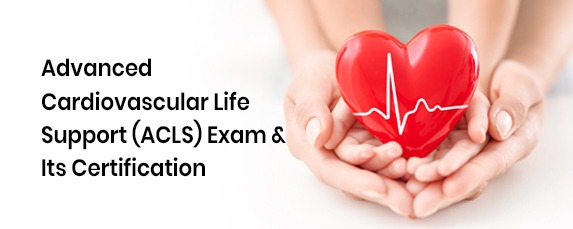Advanced Cardiovascular Life Support (ACLS) is a significant healthcare skill for medical and non-medical professionals alike. It covers all professional skills related to the responses to a cardiac emergency. ACLS exam and corresponding certification is a much sought-after niche for doctors, nurses and other professional healthcare experts.
This article sheds light on the details regarding the ACLS exam and its certification clearance. If you are planning to become a healthcare expert related to the cardiac emergency domain, then this post is definitely for you.
Introduction
The Advanced Cardiovascular Life Support system is a crucial part of most medical professions. In almost all cases, you will be asked to clear the certification in the ACLS exam within only six months of gaining employment.
Though your employer has the final say on this, it is better to verify the information first before proceeding with your medical profession. You have to try and maintain the certification status of this exam too.
ACLS: Full Form
As we mentioned earlier, ACLS stands for Advanced Cardiovascular Life Support. In some circles, it is given as the Advanced Cardiac Life Support system. It contains numerous practice tests, cardiac health resources, technical strategies and processes, and much more.
What is ACLS Certification?
ACLS certification is the medical qualification document that you receive after successfully clearing the ACLS exam. This certification is critical for maintaining your healthcare profession status in full effect (for most profiles). You also need to recertify every two years, as the certification validity only stays for this period.
The ACLS certification exam requires sufficient preparation from your end, with discipline and interest factors coming into play consistently. You may follow individual rituals for ACLS preparation, but a complete understanding of the existing resources, online and offline, is highly recommended.
What is The ACLS Protocol?
The ACLS protocols are advanced algorithms that help you respond to life-threatening cardiac health scenarios in a systematic fashion. These protocols and algorithms can extend to multiple diagnostic tools and cardiovascular care guidelines and standards.
The ACLS standards are devised by the ILCOR (International Liaison Committee on Resuscitation. The different algorithms are:
- ACLS Bradycardia Algorithm for helping patients with symptomatic bradycardia.
- ACLS Tachycardia Algorithm for treating patients with tachycardia.
- ACLS In-Hospital Cardiac Arrest in Pregnancy Algorithm for helping pregnant patients with their cardiac wellness.
- ACLS Cardiac Arrest PEA and Asystole Algorithm for managing special cases of cardiac arrest.
- ACLS Cardiac Arrest VTach and VFib Algorithm for systematically assessing and managing ventricular tachycardia and fibrillation.
- ACLS Post Cardiac Arrest Care Algorithm for post-treatment after cardiac arrest with aid in the return of spontaneous circulation.
- ACLS Acute Coronary Syndrome Algorithm for the systematic response for patients with conditions like myocardial infarction.
The protocols under the ACLS methodology are connected in some ways to the BLS algorithms and the PALS Sequence algorithms.
How Can We Qualify for ACLS?
ACLS course certification acknowledges the role of sudden assistance from healthcare experts in the field of life-saving skills. It is mandatory to possess a Basic Life Support certification to proceed with the ACLS course registration. If you are a practising nurse, then BLS registration and corresponding CPR courses are part of your medical journey.
Some of the qualification skill requirements for ACLS include recognition and management of respiratory, cardiac and peri-arrest symptoms, stroke intervention skills, pharmacology and airway management skills, etc. Your healthcare employer can support and guide you in getting the ACLS certification.
Who Should Take The ACLS Certification Examination?
The primary purpose of ACLS certification is to help professionals in the medical or healthcare domain who manage cardiopulmonary arrest and other related emergencies. If you directly or indirectly are connected to this profile, then ACLS certification is a must for you. You may also apply for the course exam registration if you are a person in cardiac emergency response.
Most healthcare professionals would cover a role in the cardiac health of the people. Once you receive the certification, you are eligible for two years of cardiac emergency response actions.
Distinguish Basic Cardiac Life Support from Advanced Cardiac Life Support
The basic life support activities focus more on promoting services in primary respiratory, cardiac care and breathing health support. These include CPR support training in your professional practice. If BLS is the fundamental building block of cardiac health aid, then ACLS is the more advanced version of it.
ACLS demands sophistication and expertise on the path of healthcare professionals to complete the course certification as well as training modules. For normal healthcare personnel, BLS knowledge is enough. But if you are looking for specialised and top-notch profiles, ACLS is the way to go. You need a BLS certification to clear the ACLS course.
ACLS Course Syllabus
As per the American Heart Association (AHA), the ACLS course syllabus consists of the below modules.
- Advanced Cardiac Life Support – consists of target audience and goal statement, accreditation statement, medical reviewers and disclosures, and instructions for participation and credit.
- ACLS Overview – consists of advanced cardiac life support, focus and course prerequisites, and course structure.
- BLS and ACLS Surveys – consist of the BLS survey, adult BLS/CPR, step-by-step CPR review, and ACLS survey.
- Team Dynamics – consists of guidelines and a team leader.
- Chain of Survival – consists of an acute coronary syndrome, acute stroke care, post-cardiac arrest care, and education within team settings.
- ACLS Cases – consists of BLS and ACLS surveys, basic airway management, oropharyngeal airway, nasopharyngeal airway, advanced airway management, sunctioning the airway, respiratory arrest, acute stroke, ACS algorithm, acute coronary syndrome, an algorithm for a suspected stroke, stable and unstable tachycardia, tachycardia algorithm, bradycardia, cardiac arrest, post-cardiac arrest care, opioid overdose algorithm, and routes of access for medication administration.
- ACLS Resuscitation Medications – consists of drug details.
- Rhythm Recognition – consists of sinus rhythm, sinus bradycardia, sinus tachycardia, sinus rhythm with 1st-degree heart block, 2nd-degree AV heart block, 3rd-degree heart block, supraventricular tachycardia, atrial fibrillation, atrial flutter, asystole, pulseless electrical activity, ventricular tachycardia, ventricular fibrillation, and torsades de pointes.
The above ACLS course units are followed by references and the ACLS final exam.
What is The Passing Score for ACLS Exam?
The required passing score for the ACLS exam is 80% or more. The ideal percentage is 84, where a candidate can miss up to 8 questions. It covers a total of fifty questions in multiple-choice mode.
Which is The Crucial ACLS Algorithm?
The most crucial and significant ACLS algorithm is the cardiac arrest algorithm or protocol. The sub-branches in this algorithm are ventricular fibrillation and pulseless ventricular tachycardia, plus treatment of asystole and PEA.
This doesn’t take anything away from the other algorithms or protocols under the ACLS course or its sub-niches. But the most prominent of the cardiovascular emergencies is the ACLS algorithm for cardiac arrest.
How Can You Prepare for ACLS Exam?
The preparation for the ACLS exam follows a guided process that ensures the use of discipline, passion and other key factors to ensure the success of candidates. The top points to consider while preparing for the ACLS exam are:
● Follow A Reliable Study Manual
It is important to follow a study manual that is completely reliant on all aspects of emergency cardiac response care. Empower yourself with a strategic study guide to raise your chances of success.
● Examine The Algorithms
Different algorithms or protocols are part of the ACLS domain. Examine and understand each one individually to get a thorough knowledge of the said algorithms.
● Learn Your H’s and T’s
The H’s and T’s are the conditional terms in ACLS algorithms. They include Hypovolemia, Hypoxia, Hydrogen ion excess, Hypoglycemia, Hypokalemia, Hyperkalemia, Hypothermia, Tamponade – cardiac, Toxins, Tension pneumothorax, and Thrombosis (pulmonary embolus and myocardial infarction).
Essential knowledge of the H’s and T’s in the ACLS algorithm is vital for your certification exam preparations.
● Take The Mock Test
Mock tests are available to help you prepare better for the ACLS exam. Both online and offline resources are available, ensuring that there is no way for you to miss out on getting a first-hand idea of the whole process.
● Go Through An ACLS Exam Preparation Course
A guided preparation technique will do wonders in helping you go miles to get the best out of the ACLS certification exam. You can partner with a proven expert agency in the domain to help you with the same.
How Often is The ACLS Exam Available?
The ACLS exam is available on multiple occasions throughout the year. Since the validity is for two years, you will need chances to retake the test and get recertified. For each course, you have a total of three attempts. If you fail in all three attempts, you need to retake the course from the beginning.
What Happens if The ACLS Certificate Expires?
The ACLS certificate expires after two years. You need to retake the exam and get recertified in the ACLS specialization as it is relevant for maintaining your job profile in the healthcare domain. Without ACLS certification, you will lose your chance to pursue the practice.
How is The ACLS Different from CPR?
The ACLS is way different from the CPR training modules in terms of sophistication and expertise. The biggest difference lies in the application scenario. Cardiopulmonary Resuscitation (CPR) is a cardiac arrest response technique that can be employed by the general public.
ACLS is strictly for emergency medical personnel. The cardiac arrest response, in this case, is carried out in specialized healthcare spots like intensive care units. Though both are relevant to the heart health category, their certification course processes and programs vary.
How Long is ACLS Certificate Valid?
As we mentioned earlier, the ACLS course certificate is valid for two years. It is mandatory to carry on with the recertification process as long as you are part of the healthcare profession that requires an ACLS certification. Stay on top of the course curriculum at all times to ensure your certification stays positive at all times.
How Much Does ACLS Certification in India Cost?
The average course fee for the ACLS certification in India is Rs. 6500. The duration of the course is generally less, ranging from one to two days only, and you can get it done online. The average cost price, in this case, is Rs. 4000 to Rs. 7000.
You can get these courses exclusively in top cities like Mumbai, Delhi, Bangalore, Chennai, Hyderabad and Cochin. You have the guarantee to try and succeed in an ACLS certification, irrespective of your geographical location.
Conclusion
Having advanced knowledge and certification in the ACLS exam will not only expand your chances of growing in the healthcare career but also paves the way for being part of the health and wellness segment with more meaning and value.
The best way to crack the ACLS certification is to approach the sector with passion and genuine interest. You should strive to achieve a level keeping the ones who need cardiac support and care in mind.




